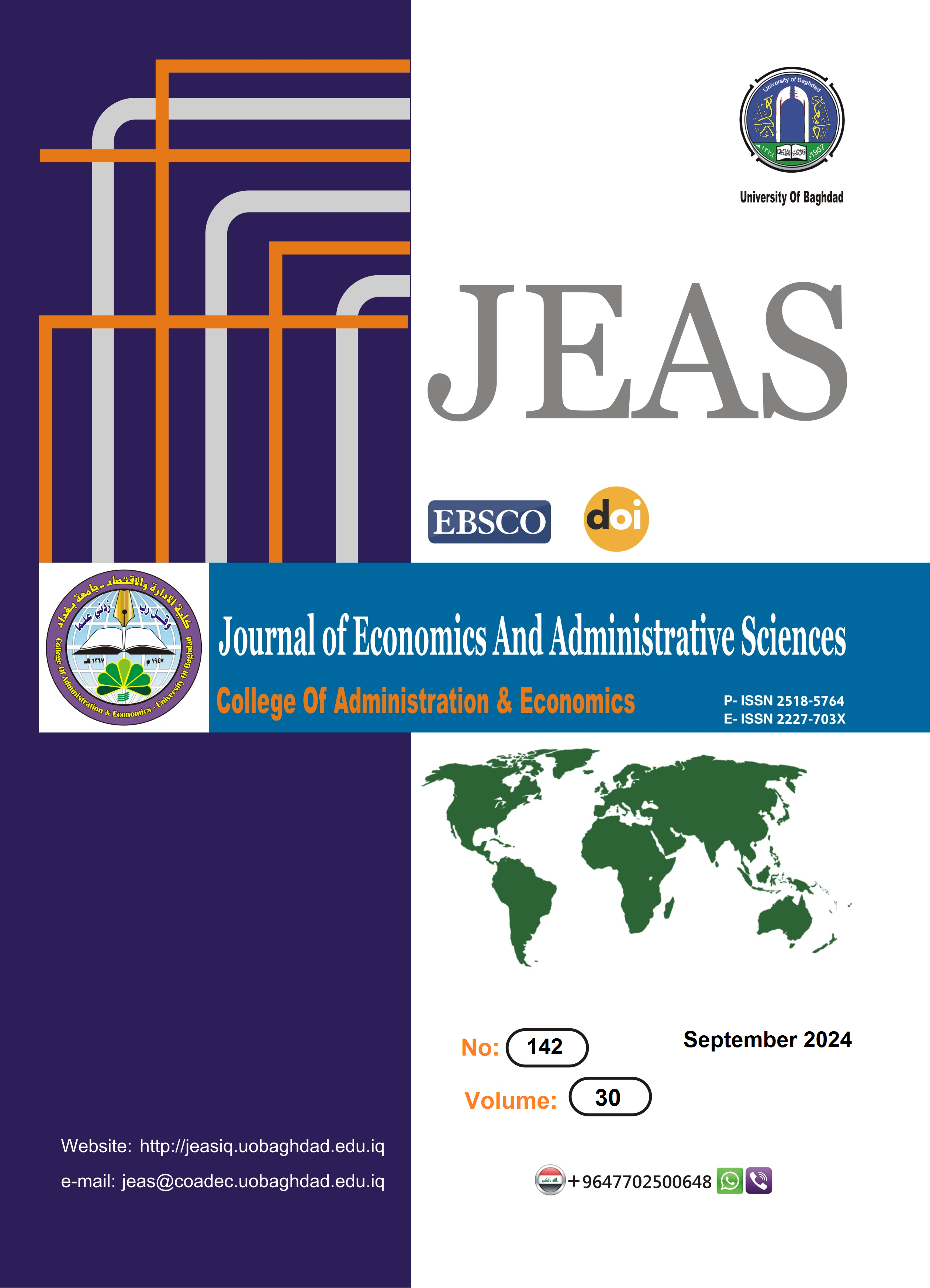An Investigation of level Applying Environmental sensing strategies in the National Security Advisory : An Empirical Research
DOI:
https://doi.org/10.33095/f39khy88Keywords:
Environmental Sensing, Prediction Strategy, Scaling strategy, Lockdown Strategy, National Security Advisory (NSA).Abstract
This research aims to diagnose the level of embodiment of environmental sensing strategies in the National Security Advisory in Iraq. The importance of the research is evident from the importance of the topic it deals with. Environmental sensing in its three dimensions (Prediction strategy, scaling strategy, and Lockdown strategy) is one of the crucial issues in the success of organizations of all kinds. In addition to the importance of the researched organization (NSA), which is one of the most important components of ministries and security institutions and its active role in ensuring the security and stability of the country at the national and global levels. The problem of the research is how to read environmental variables by the (NSA) in a proactive manner through which it can make decisions that help it in preparing and drawing operational and strategic plans, as the research question expresses (what is the nature and level of interest in environmental sensing strategies at the NSA). The research included a sample of (90) respondents who hold positions in the NSA, and the questionnaire was used as a main tool for data collection. A group of statistical methods were used supported by the statistical program (SPSS) in order to obtain the results. The most important results were the variation in the embodiment of environmental sensing strategies in the research sample within the (NSA), where the prediction strategy came in order, then the scaling strategy, and finally the Lockdown strategy, respectively.
Paper type Research paper
Downloads
References
References:
Abdel Qader, K. M. J. (2006), Environmental sensing strategies: production decisions- operations- relationship and impact: a field study on a sample of industrial organizations in Nineveh Governorate, Business Administration Master Thesis, University of Mosul.
Abdulhameed, A. A. and Al-Kubaisy, S. A.(2023), The Effect of Knowledge Upgrading on Business Continuity:A Field Research in Private Colleges and Universities in Baghdad, Journal of Economics and Administrative Sciences, Vol.29, No.136, pp. 1-15.
Abu Aura, A. A. (2016), Environmental sensing strategies and their impact on achieving strategic flexibility: a field study - Jordan Phosphate Mines Company, Public Shareholding Limited, Master's Thesis, Mutah University.
Abu Salim, A. M. (2014), The impact of environmental sensing strategies in achieving strategic dexterity. Master Thesis, College of Business, Middle East University, Business Administration, Amman, Jordan.
Al-Amiri, S. M. M. and Al-Ghalbi, T. M. M. (2011). Administration and Business, 3rd ed., Dar Wael for publication and distribution, Amman, Jordan.
Al-Fayyad, M. H. (2019), The relationship between dynamic capabilities and strategic flexibility and its reflection on the effectiveness of decision-making: field research in the Ministry of Health. Public Administration PhD thesis, College of Administration and Economics, University of Baghdad.
Al-Hait, N. B. A. (2017), Critical success factors for information systems and their role in achieving competitive business strategies: the mediating role of environmental sensing, master's thesis, College of Business, Amman Arab University, Amman, Jordan.
Al-Najashi, S. A. S. (2020), The impact of environmental sensing strategies on achieving competitive strategies through interconnected diversification as a strategic option in Al-Kbous Group for Industry, Trade and Investment Master's thesis, Faculty of Business, Amman Arab University, Jordan.
Al-Qaryouti, M. Q. (2008), Organization and organization theory, 3rd ed., Dar Wael for publication and distribution. Amman, Jordan.
Al-Qatraneh, Z. A. (2017), Leadership styles and effective decision-making, 1st ed., Academic House for Publishing and Distribution, Amman, Jordan.
Amanah, A. A., Hussein, S. A. and Fadhil, A. H.(2022), Assessing the relationship of strategic alignment with strategic response: mediating role of strategic thinking: prospective analytical research in Karkh health directorate - Baghdad / Iraq, International Journal Of e-business And e-government Studies, Vol. 14, No.2, pp. 388-410.
Carlile, P. (2002). APragmatic view of Knowledge and Boundaries :Boundary Objects in new product Development Organization Science (Vol. 13(4)).
Dagher, M. M. and Saleh, A. H. (2000), Organization theory and organizational behavior, House of Books and Documents for Printing, Baghdad, Iraq.
Fennell, M. L., and Alexander, J. A. (1987). Organizational Boundary Spanning in Institutionalized Environments. The Academy of Management Journal, 30(3), pp. 456–476
Gad Al rab, S. M. (2016), Strategic planning is a method for achieving competitive excellence, 1st ed., Dar Al-Fajr for publication and distribution, Cairo, Egypt.
Ghazi, A. A. (2018), Employing the capabilities of environmental sensing in enhancing the strategic position of the organization: an analytical study of the opinions of a sample of managers and employees in communication companies, Business Administration Master's thesis, College of Administration and Economics, University of Karbala.
Harem, H. (2010), Organization management - a holistic perspective, 2nd ed., Dar Al-Hamid for publication and distribution, Amman, Jordan.
Hassan, N. K. and Hamed, S. A.(2022), The impact of digital leadership in the effectiveness of organizational crisis management by mediating strategic vigilance, Journal of Economics and Administrative Sciences, Vol.28, No.133, pp. 1-20.
Hassan, Z. A. and Raheemah, S. H.(2021), Servant Leadership and its Impact on the Effectiveness of Teamwork, Vol.27, No.129, pp. 69-84.
Hussein, A. A. A.(2016), The effectual relationship between environmental sensing strategies and strategic renewal through the mediating role of strategic agility. Karbala University Scientific Journal, Volume 14, Issue 3.
Ibrahim, Khalil Ibrahim, Abboud, Suhad Faisal and Fanjan, Namariq Latif. (2022). Environmental sensing strategies as an entry point to achieve the strategic success of business enterprises through the mediating role of strategic ingenuity. Heritage College Journal, Issue 33
Karkhi, M. (2014), Strategic planning based on results, Al Rayyan Press, State of Qatar.
Levina, Natalia, and Emmanuelle Vaast. (2004) "Understanding boundary-spanning in knowledge work: Implications for IT use." Unpublished manuscript
Ofstein, L.F., and Shrader, R.C. (2012). Boundary spanning in the entrepreneurial firm: effects on innovation and firm performance (interactive paper), Frontiers of entrepreneurship research, 33, 14
Salman, F. A. A., Al-Shammari, M. A. J. and Al-Shammari, A. A. A.. (2021), The impact of environmental sensing processes in enhancing indicators of strategic success, Journal of Administration and Economics, Volume (10), Issue (37), pp. 69-86.
sturdy, A., and Wright, C. (2011). The active client : The boundary - spanning roles of internal consultants as gatekeepers ,brokers, and partners of their external counterparts. Management Learning ,42(5), pp. 1-36.
Zidan, S. Z. (2017), Strategic depth The location of planning and information in decision-making, 1st ed., Dar Zahran for publication and distribution, Amman, Jordan.
Published
Issue
Section
License
Copyright (c) 2024 Journal of Economics and Administrative Sciences

This work is licensed under a Creative Commons Attribution-NonCommercial-NoDerivatives 4.0 International License.
Articles submitted to the journal should not have been published before in their current or substantially similar form or be under consideration for publication with another journal. Please see JEAS originality guidelines for details. Use this in conjunction with the points below about references, before submission i.e. always attribute clearly using either indented text or quote marks as well as making use of the preferred Harvard style of formatting. Authors submitting articles for publication warrant that the work is not an infringement of any existing copyright and will indemnify the publisher against any breach of such warranty. For ease of dissemination and to ensure proper policing of use, papers and contributions become the legal copyright of the publisher unless otherwise agreed.
The editor may make use of Turtitin software for checking the originality of submissions received.


























